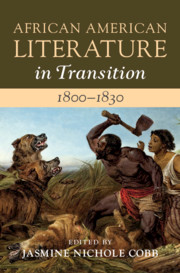Book contents
- African American Literature in Transition, 1800–1830
- African American Literature in Transition
- African American Literature in Transition, 1800–1830
- Copyright page
- Contents
- Figures
- Contributors
- Preface
- Chronology
- Introduction
- Part I Black Organizational Life before 1830
- Part II Movement and Mobility in African American Literature
- Part III Print Culture in Circulation
- Chapter 7 Reading, Black Feminism, and the Press around 1827
- Chapter 8 “Theresa” and the Early Transatlantic Mixed-Race Heroine
- Chapter 9 Redemption, the Historical Imagination, and Early Black Biographical Writing
- Part IV Illustration and the Narrative Form
- Index
Chapter 7 - Reading, Black Feminism, and the Press around 1827
from Part III - Print Culture in Circulation
Published online by Cambridge University Press: 11 March 2021
- African American Literature in Transition, 1800–1830
- African American Literature in Transition
- African American Literature in Transition, 1800–1830
- Copyright page
- Contents
- Figures
- Contributors
- Preface
- Chronology
- Introduction
- Part I Black Organizational Life before 1830
- Part II Movement and Mobility in African American Literature
- Part III Print Culture in Circulation
- Chapter 7 Reading, Black Feminism, and the Press around 1827
- Chapter 8 “Theresa” and the Early Transatlantic Mixed-Race Heroine
- Chapter 9 Redemption, the Historical Imagination, and Early Black Biographical Writing
- Part IV Illustration and the Narrative Form
- Index
Summary
From their initial explosion, African American women’s literary societies would go on to outnumber men’s organizations from the 1830s through the 1850s. Literary societies were also sites for the imbrication of oratory and print, since they included not only reading but also listening to texts read aloud, so that members of literary societies need not have been textually literate. Taking Maria Stewart’s first letters to the editor, in Freedom’s Journal in 1827 and The Liberator in 1832, this chapter will argue that the social gospel that would go on to define her career includes a prototypical Black feminist politics that we see emerging in the interconnected female-dominated Black literary societies and fledgling Black press around this time and reaching into the decades that follow. Stewart saw reading newspapers as essential to responsible citizenship for Black women, and understood both literary societies and newspapers as ways to forward her radical politics.
Keywords
- Type
- Chapter
- Information
- African American Literature in Transition, 1800–1830 , pp. 171 - 201Publisher: Cambridge University PressPrint publication year: 2021

